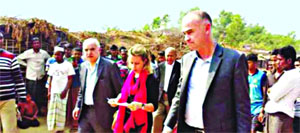Bangladesh Foreign Minister AH Mahmood Ali told the Jatiya Sangsad on Tuesday that Dhaka would continue working for a permanent solution to Rohingya crisis on the basis of bilateral friendship and mutual understandings through further strengthening multifaceted relations with Myanmar.
“I hope that we would be able to reach an acceptable resolution to the long-standing crisis through diplomatic understandings with the friendly country Myanmar and cooperation of the United Nations, OIC and other regional bodies,” he said.
The minister said this in the Jatiya Sangsad while responding to a written question from treasury bench member Begum Pinu Khan.
He expressed the hope that Dhaka would be able to repatriate the Rohingya refugees, who took shelter insides Bangladesh following persecution of the law enforcement agencies in Myanmar’s Rakhaine state, to their homeland peacefully on the basis of international opinion.
Listing different activities of the government to solve the problem and repatriation of the Rohinga refugees, Mahmood Ali said Bangladesh is continuing discussions with the Myanmar government and the United Nations High Commissioner for Refugees (UNHCR) to repatriate them to Rakhaine state of Myanmar soon.
“The Awami League government from its last tenure has been working relentlessly for a permanent and acceptable solution to the problem,” he added.
In this connection, he said at present around 33,000 registered and over 300,000 unregistered Myanmar citizens are staying in different Rohingya camps in Cox’s Bazar, Bandarban, Chittagong and other parts of the country.
Recently more than 67,000 Myanmar citizens entered Bangladesh being persecuted by Myanmar authorities.
He said Prime Minister Sheikh Hasina gave directives for repatriating the Myanmar citizens to their homeland.
These included strengthening contacts with the UN and the OIC to put pressure on Myanmar for a long lasting solution to the problem along with ensuring their rights, continuing bilateral cooperation with Myanmar to prevent militancy and separatist activities in both the countries, putting pressure on Myanmar government for repatriation of their citizen and continuing diplomatic process to this end.
Following PM’s directives, the minister said Dhaka has strengthened diplomatic efforts at bilateral, regional and multilateral levels for repatriation of Rohinga refugees to their homeland along with ensuring their rights.
Earlier on Sunday, a three-member delegation of the Advisory Commission on Rakhine State visited two Rohingya camps in Ukhia and Teknaf upazilas in Cox’s Bazar
The delegation members are chair of the Myanmar National Human Rights Commission Win Mra, former UN Special Advisor to Secretary-General (2003-2006) Ghassan Salame’, and Core Member and Founder of Religious for Peace, Myanmar Aye Lwin.
The delegation reached a new Rohingya camp at Balukhali in Ukhia upazila around 11:40am and talked to the new arrivals of the Rohingya and saw the situation on the ground.
During the hour-long discussion, some of the Rohingya people informed the delegation that they fled Rakhine to Bangladesh after being failed to endure the torture unleashed by the military of the Myanmar government.
They said the army persons had shot many Rohingyas to death after picking them up from their houses and torched their houses.
Later, the Rakhine Commission team visited another Rohingya camp at Leda in Teknaf upazila.
Meanwhile, the European Rohingya Council (ERC) expressed its deep deeply shocke and concern over Bangladesh government’s “inhumane and irresponsible” proposal to relocate Rohingya refugees forcefully to Thengar Char Island.
According to the news reported by BBC on 30 January, Bangladesh government is planning to relocate Rohingya refugees to a remote island called Thengar Char before they have been repatriated to Myanmar.
The island located in the Bay of Bengal is vulnerable to flood, and is not suitable to human inhabitants. The low-lying island, which is nine hours’ journey from the refugee camps, is surrounded by high water and has no access by roads. The island even doesn’t appear in the maps. The impossibility to inhabit in the island is best describe by the official who told AFP news agency as, “The island is only accessible during winter and is a haven for pirates. It completely inundates during the monsoon. It’s terrible idea to send someone to live there.”
Source: Weekly Holiday









